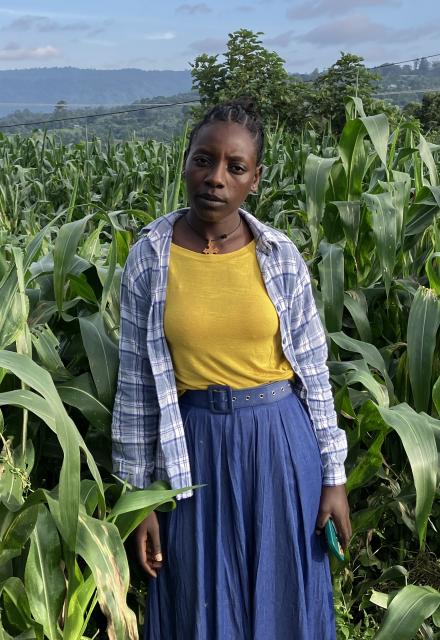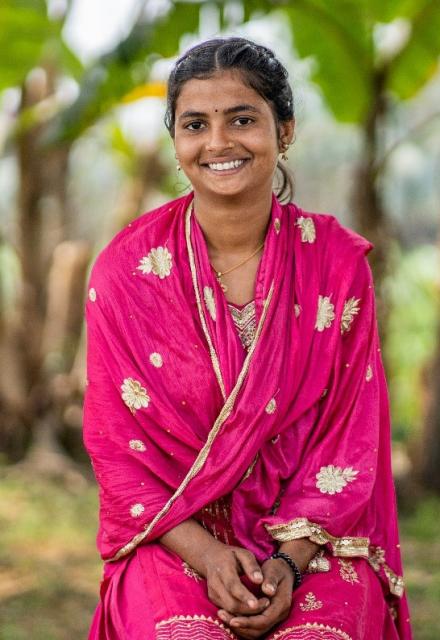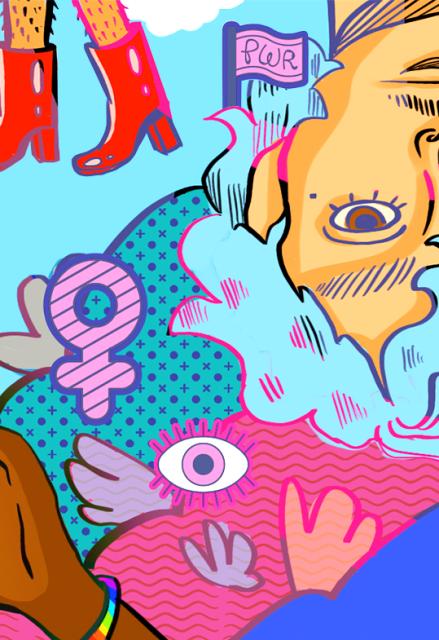"I always write. Writing is something I love doing. Writing is my creative activism".
Maryjacob Okwuosa writes poetry on her Android phone, when she is not grinding and working hard for gender equality and deep societal transformation rooted in intersectional feminist ideals. Her activism and her poetry are fueled by her emotions, her frustrations, her love, her community; and her phone permits her to write and work no matter where she is.
- My phone is the one object I have never forgotten.
She says and laughs crisply, before she continues in a hoarse playful voice.
- It’s everywhere I go! I love it! It’s like my friend and we are super cute together. She laughs a clear laugh again. We love each other and it keeps all my memories for me, and it does my work! My concept notes, budgets, all my ideas for creative activism, communication with friends. It is all on my phone. I even call it my baby! And I always write. Writing is something I love doing. Writing is my creative activism. I feel like the only way I can communicate those words is through my heart and just write them. I am writing more and more poetry. You know I always had this fantasy, that I wanted to travel the world, writing books, seeing other cultures. I would just live off basic things to eat, without wanting too much. But this is just a fantasy, she says on a more serious note.

Maryjacob started playing with realities as a child. Before she started writing, she would act as a great theatre director on the stages of her playgrounds, by spontaneously scrapping together dramatic plays with her playmates. Then one day a teacher inspired her to write these impulsive stories down and before she even knew what she was doing, she was rolling out ambitious dramas casting girls in roles and characters that they would never even dream of embodying out in the real world. Challenging the status quo before she knew what activism was.
- Yeah, I loved telling stories when I was a child. So, I started writing these short dramas, and I invited the kids from my neighborhood to play, and then the girls might not even show up because they had to do chores at home. But if they did show up and I had a character that was a banker, and wanted the girl to play the banker, someone would say – “No she can’t be a banker, she’s a girl! She can play my wife!”. And I would say – “Why?”. So, I became conscious that if I was going to tell a story, I had to show that girls can do many different things.
Someone called her a feminist when she was only ten years old, and she had no idea what a feminist was, but she liked the sound of it. She felt that urge to disrupt societal norms and challenge the main story being told about women. As a teenager she initiated a youth driven education platform, to grant more girls access to school. Organisational skills have carved a story into her life, shaping the community she is currently empowering as Executive Director of Whisper to Humanity - youth empowering organisation that stimulates critical thinking about gender roles through education. When she must recount which moment changed her youthful drive for change into focused work for systemic transformation, Maryjacob opens up about a situation from when she was 19 years old, at her first activist training program organised by The Women's programme of ActionAid Nigeria, where a teacher suddenly challenged her:
- Our teacher she referenced a story I had been sharing. And she said – “You know you are doing amazing work, but you don’t have a method to sustain the changes you made happen. You do not have a plan on how to make the change last. To make sure that the change keeps happening” she said in front of the whole team. “So how do we make a plan?” I asked myself. Activated by this reflection, I went through a process of exploring how I could do this, find a plan for sustainable change. I started learning about stakeholder mapping and instead of just solving the problems around me, I learnt how to go to the root cause of the problem, a more sustainable way to make sure that the change I was pushing for, would go viral in every imaginable way.
"I wanted to start having open conversations about feminism for boys and for men".

She never had the typical girl dreams. Or rather, she never was attracted to the story that was told about what girls could desire – like getting married and being a woman in the house. Because of this her peers viewed her as a bit rough on the edges. Because of this she felt as if she could be attacked at any moment. She only had one other girlfriend growing up, a young woman who would attend school heartbroken because her father was aggressive and beating up her mother. Maryjacob experienced this up front and started realising that feminism was not just for women, but most certainly crucial for men and boys. She saw how all these crying mothers were everywhere and all these dominant violent fathers would become the future story of her classmates. A story repeated from generation to generation. A pattern she did not want to continue.
- I saw my friends, my male mates be as toxic as their fathers, just because they didn’t know any better. As much as they loved their mums, they expected their future wives to also be restricted to the home chores. So, I wanted to start having open conversations about feminism for boys and for men. Feminism deepens our understanding, because many people think feminism is a women’s thing, but it’s not just for women, men have been on the receiving end of negative patterns all these years – we have the toxic masculinity, we have the pressure ‘to man up’, we have the pressure to ‘pay the bills and be the man of the family’, we have the pressure to be perfect. Many young boys and men do not have an identity of their own, if not for the characteristics that society has told them – this is a man! And these pressures are something our sons, brothers, friends must face! When we start having these open conversations about feminism, we will teach boys, not to be the hand that girls need to protect themselves from.

The educational work that Maryjacob organises and facilitates, is done in companionship with her colleagues and friends, people she calls her family. She describes how she experiences the creation of community as something that unfolds organically, but that all these years of hard driven organisational work has left some traces on her spirit these days. And when asked how she is feeling, she laughs and wants to be honest, describing how these times are tough on her spirit and she just can’t seem to find her motivation. Possibly a temporary burnout, which activists experience all over the world. Something which underlines the importance of a regenerative practice.
- I feel tired. I feel disconnected. Uninterested. I feel like I probably should go to a beautiful little farm and just write books instead of doing what I’m doing. I don’t know if I have the right words, but I probably have been telling myself for the past few days, to hang on, just hang on. The most depressing time in my life was three years ago when I lost my mum. I couldn’t think straight. But funny enough in those times, doing what I do, I worked with an energy where I was trying to make the world a better place. This was like a pushing force. Through that period, I still felt like I could make the world better. I could keep grinding, I felt like my mum was going to feel proud. I did not feel disconnected with my work. To be very sincere, my work helped me pass through those hard times.
When Maryjacob’s mother was alive, she would tell her daughter about times of war, and about how the true meaning of the word Mmadu (‘human being’ in Igbo) translates to the beauty of life. She would say: “If we can start to see others as Mmadu, as we all reflect the beauty of life, then we wouldn’t have conflicts, nor segregations, we would see beyond regions, tribes, and nations.”
- That helped me. So now, as a tool, I always ask myself, before taking on any cause or starting any action, I ask myself - “Is this cause taking on humanity as the beauty of life, or is it trying to fight a particular ideology?” This brings me back to my foundation. Always.
"The same hall where I created and directed my first stage play, is now a well-lit theatre with happy learners, singing, playing, and loud with laughter as they own the space".

- The ability to imagine a desired future is one of my greatest driving forces. In tough times like now, when it feels like this work is not worth doing, I remind myself why I started. I remind myself how I envision the future to be. And if that future is not here yet, then I shouldn’t stop. It’s ok to take a break and pause, but then get yourself together and keep grinding. It’s like a long journey, when you get to a bus stop, you may miss the bus and you just want to grab a snack while you’re waiting for the next bus. And sometimes you just don’t want to get on that bus! Ha-ha. Sometimes the bus seems too empty. And then you go to another city than was the plan and you just get a drink and sleep in. And that’s fine. But then you get up again and keep doing that work, to create a future where children will not be spoken to differently depending on their gender. Learning spaces will be accessible to every child, no matter their skin colour or gender. An educational system that is totally transformed and human beings are just human beings.




